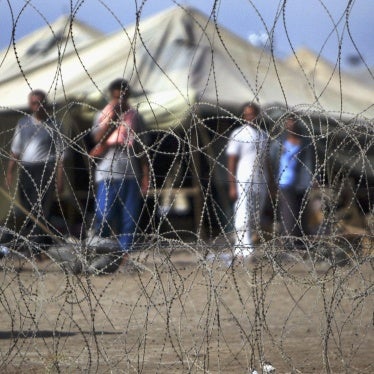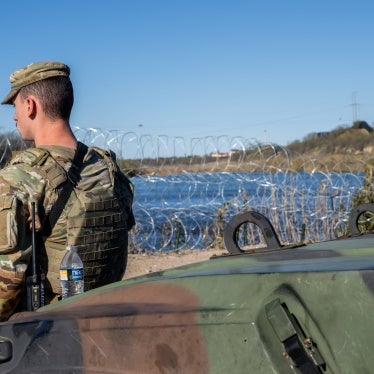I once represented a woman with a string of shoplifting convictions in immigration court. Jenny was a green card holder, from the English-speaking Caribbean. She had very little money and her five US-citizen children to raise alone. Her shoplifting convictions often coincided with Christmas and involved the theft of toys or clothes. In addition to the multiple fines and short stays in jail she faced related to these convictions, she was also facing deportation.
Looking at her rap sheet, one charge was different from all the others – it was for child endangerment. When I asked Jenny about it, tears sprung to her eyes as she explained that she couldn’t make bail after an arrest for shoplifting and was held in a New York City jail, under pretrial detention for lack of a few hundred dollars, despite being a single mother. Hard as she tried, she was unable to get in touch with her sister from jail. After an unrelated emergency in her Bronx apartment building caused city workers to knock on her apartment door, her kids were found alone and child services got involved. While Jenny eventually got the child endangerment charges dropped and kept custody of her kids, the fact that the charges were still there on her rap sheet – and the related trauma it brought to her mind – were emblematic of devastating harms to her family linked to her time spent in jail before conviction.
Jenny made some bad decisions. And while my representation of her centered on whether she would have to pay for her crimes with deportation, I was struck by how her pretrial experiences had really impacted the totality of her life: her family, her children’s schooling, her work prospects, and her ultimate chances in turning things around.
To date, so much criminal justice reform work, including that of the US Program at Human Rights Watch, has centered on fixing our harsh sentencing laws – and rightly so. But a human rights approach to reforming the US criminal justice system must also engage with everything that happens before conviction – real reform must also tackle the intersection between criminal justice, race, and poverty. Those intersections are acutely real in the pre-trial realm.
Every year in the United States, over 12 million people are held in local jails. On any given day, there are over 700,000 people held in jail. Most of them are being held pretrial, but almost 300,000 are serving time for misdemeanors. Some people end up in jail for failure to appear in court or failure to pay a fine on, for example, a speeding ticket.
Arrest, pre-arraignment and pretrial detention can have overwhelming consequences for people’s lives. A day of work missed may not sound like much, but hourly minimum wage workers can lose their jobs over much less. If a defendant chooses to fight her case, she is likely to have at least one court date per month if she is not in jail, and an employer may not be sympathetic. A person who has been arrested may be responsible for child care or the care of an elderly relative and may be unable to arrange for such care upon arrest.
Pretrial detention also increases the likelihood a defendant will plead guilty and serve a longer sentence. As noted by a recent Vera study, jail has become “a gateway to deeper and more lasting involvement in the criminal justice system at considerable costs to the people involved and to society at large.”
Diversion: Keeping People out of Jail
Jailing practices have had a disproportionate impact on communities of color and on people with mental disabilities. Nationally, African Americans are jailed at almost four times the rate of white Americans despite their making up only 13 percent of the US population. The Vera study notes that local disparities can be even starker: in New York City, for example, blacks are jailed at nearly 12 times and Latinos more than five times the rate of whites.
Serious mental illness affects people in jail at rates that are four to six times higher than in the general population. The US Program of Human Rights Watch has recently documented how poorly equipped jails are to address the needs of this population. Partly as a result of insufficient knowledge and resources, jail staff throughout the United States have used unnecessary, excessive, and even malicious force against people with mental illness.
Given the harm to people and their families that comes from even a short stay in jail, we need to ask whether pretrial detention is always necessary. California took an important step in the right direction last year by passing Proposition 47, which reclassifies certain nonviolent felonies as misdemeanors, thereby reducing sentences and the prison population. Money saved is allocated to mental health and drug programs, education, and victim compensation. Prop 47-type reforms (reclassification of offenses) can be applied to misdemeanors. Reclassifying some misdemeanors as civil violations could take them out of the criminal justice system entirely. People charged with these offenses would not be subjected to pretrial detention.
New York City is considering exactly this type of reform. Council Speaker Melissa Mark-Viverito has stated her intention to introduce a proposal to reclassify some commonly-charged criminal court summonses as civil violations, answerable to an administrative court and not subject to jail time.
Bail reform
The US Program of Human Rights Watch found in 2010 that among New York City defendants arrested on nonfelony charges who had bail set at $1,000 or less, 87 percent were incarcerated because they were unable to post bail at their arraignment. In other words, people are spending time in jail only because they are too poor to afford bail.
Research also indicates racial discrimination in setting bail. One study found that blacks and Latinos charged with “misdemeanor person offenses or misdemeanor drug offenses” were much more likely to have bail set at arraignment than similarly situated white defendants. The bottom line is that jurisdictions all over the country rely too much on money bail, which has a disparate impact on poor people of color. We should move away from that model. Something as simple as a reminder phone call and a bus card could ensure attendance at court dates.
Indigent defense
Our jails are filled with poor people of color who cannot post bail, and who – if they are facing misdemeanor charges – may have an overworked and underpaid lawyer with little time to focus on their case; or at worst – no attorney at all.
Former Attorney General Eric Holder called the state of indigent defense in the United States "unconscionable" and said that “America’s indigent defense systems exist in a state of crisis.” Some parts of the country don’t have an indigent defense system in place at all. In Texas, which lacks a statewide public defender system, defendants regularly plead guilty to misdemeanors without legal counsel. The quality of misdemeanor representation is particularly concerning because most people first encounter the justice system through a misdemeanor arrest and conviction.
A simple first step for the United States would be the establishment of nationwide standards for indigent defense: those promulgated by the American Bar Association and the National Legal Aid and Defender Association are good models, both requiring, among other things, that public defenders be independent, appointed soon after arrest, have reasonable caseloads, and receive training and support.
I’m reminded of Jenny: she was poor, she was black, she couldn’t post bail, had no opportunity for diversion from jail, and she had an overworked attorney until the big firm I worked for got involved and defended against her deportation. Jenny and her children suffered due to her pretrial experiences; but society suffered too in wasted days spent behind bars, costly child services, and court proceedings. Holding people accountable for wrongdoing is a primary tenet of human rights law; but I am convinced we can do much more to avoid the pretrial experiences of people like Jenny while at the same time ensuring justice for all.









